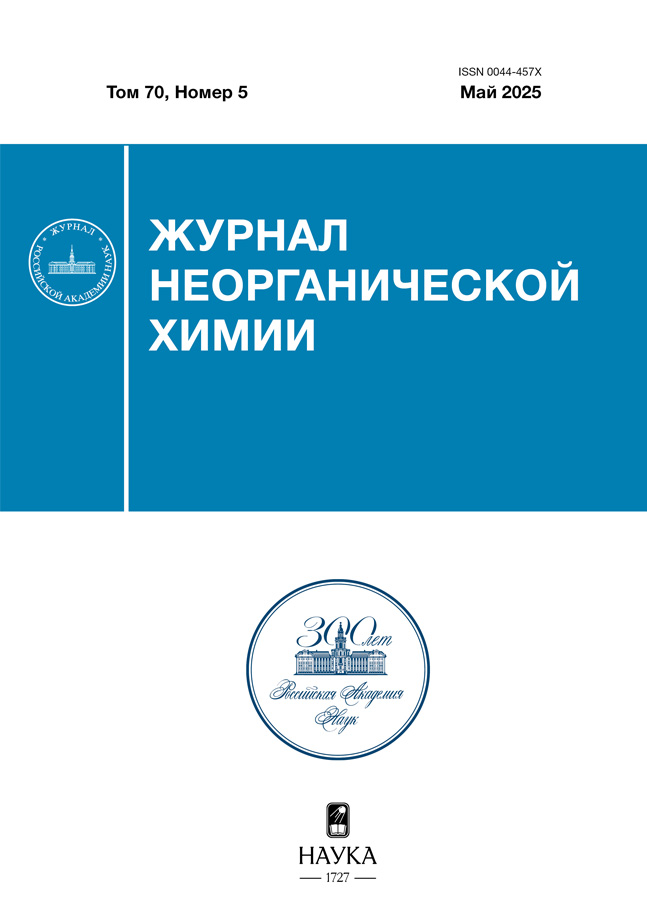Substitution of praseodymium for cadmium and lead in the Pr5Mo3O16+δ structure
- Autores: Sidorenko А.О.1, Berezhnaya Т.S.2, Pasechnik L.V.1, Ukleina I.Y.2, Guseva A.V.2, Chebyshev K.А.2
-
Afiliações:
- Donetsk State University
- North-Caucasus Federal University
- Edição: Volume 70, Nº 5 (2025)
- Páginas: 652-659
- Seção: СИНТЕЗ И СВОЙСТВА НЕОРГАНИЧЕСКИХ СОЕДИНЕНИЙ
- URL: https://ruspoj.com/0044-457X/article/view/685466
- DOI: https://doi.org/10.31857/S0044457X25050047
- EDN: https://elibrary.ru/HYBWTJ
- ID: 685466
Citar
Texto integral
Resumo
Solid solutions based on fluorite-like phase in systems Pr5–xMexMo3O16+δ, where Me = Cd, Pb, were obtained by solid-phase synthesis from metal oxides. The phase content after calcination at 1000°C was studied by X-ray diffraction, the substitution limits and the dependences of the unit cell parameter on the composition of the systems were determined. The parameters of the crystal structure of solid solutions were specified by the Rietveld method. The influence of magnesium oxide additives on the sinterability of cadmium-containing solid solutions has been established. Isomorphous substitution of praseodymium by lead and cadmium leads to a decrease in the conductivity value of the samples in the studied systems.
Texto integral
Sobre autores
А. Sidorenko
Donetsk State University
Email: chebyshev.konst@mail.ru
Rússia, Donetsk, 283001
Т. Berezhnaya
North-Caucasus Federal University
Email: chebyshev.konst@mail.ru
Rússia, Stavropol, 355017
L. Pasechnik
Donetsk State University
Email: chebyshev.konst@mail.ru
Rússia, Donetsk, 283001
I. Ukleina
North-Caucasus Federal University
Email: chebyshev.konst@mail.ru
Rússia, Stavropol, 355017
A. Guseva
North-Caucasus Federal University
Email: chebyshev.konst@mail.ru
Rússia, Stavropol, 355017
K. Chebyshev
North-Caucasus Federal University
Autor responsável pela correspondência
Email: chebyshev.konst@mail.ru
Rússia, Stavropol, 355017
Bibliografia
- Shlyakhtina A.V., Avdeev M., Lyskov N.V. // Dalton Trans. 2020. V. 49. P. 2833. https://doi.org/10.1039/C9DT04724G
- Shlyakhtina A.V., Lyskov N.V., Šalkus T. // Int. J. Hydrogen Energy. 2021. V. 46. P. 16965. https://doi.org/10.1016/J.IJHYDENE.2021.02.029
- Morkhova Ye.A., Orlova E.I., Kabanov A.A. // Solid State Ionics. 2023. V. 400. P. 116337. https://doi.org/10.1016/j.ssi.2023.116337
- Bazarova Zh.G., Subanakov A.K., Bazarov B.G. // J. Struct. Chem. 2022. V. 63. P. 1678. https://doi.org/10.1134/s1063774523601430
- Pautonnier A., Coste S., Barré M., Lacorre P. // Prog. Solid State Chem. 2023. V. 69. 100382. https://doi.org/10.1016/j.progsolidstchem.2022.100382
- Efremov V.A. // Russ. Chem. Rev. 1990. V. 59. P. 627. https://doi.org/10.1070/RC1990v059n07ABEH003547
- Shlyakhtina A.V., Lyskov N.V., Kolbanev I.V. // Russ. J. Electrochem. 2023. V. 59. P. 60. https://doi.org/10.1134/s1023193523010081
- Voronkova V.I., Kharitonova E.P., Belov D.A. // Solid State Ionics. 2012. V. 225. P. 654. https://doi.org/10.1016/j.ssi.2012.03.002
- Biendicho J.J., Playford H.Y., Rahman S.M.H. // Inorg. Chem. 2018. V. 57. № 12. P. 7025. https://doi.org/10.1021/acs.inorgchem.8b00734
- Tsai M., Greenblatt M., McCarroll W. // Chem. Mater. 1989. V. 1. № 2. P. 253. https://doi.org/10.1021/cm00002a017
- Qi S., Xie H., Huang Y. // Opt. Mater. Express. 2014. V. 4. № 2. P. 190. https://doi.org/10.1364/OME.4.001444
- Yu R., Fan A., Yuan M. // Opt. Mater. Express. 2016. V. 6. P. 3469. https://doi.org/10.1364/OME.6.002397
- Bin Deng, Yue Yang, Wensheng Chen // J. Mater. Sci. – Mater. Electron. 2022. V. 33. № 29. P. 23042. https://doi.org/10.1007/s10854-022-09071-2
- Коваль К.А., Голубович В.С., Бережная Т.С., Чебышев К.А. Химические проблемы современности / Донецк: ФГБОУ ВО “Донецкий государственный университет”, 2024. С. 130.
- Lyskov N.V., Kotova A.I., Petukhov D.I. // Russ. J. Electrochem. 2022. V. 58. P. 989. https://doi.org/10.1134/S102319352211009X
- Istomin S., Kotova A., Lyskov N. // Russ. J. Inorg. Chem. 2018. V. 63. P. 1291. https://doi.org/10.1134/S003602361810008X.
- Istomin S., Lyskov N., Mazo G. // Russ. Chem. Rev. 2021. V. 90. P. 644. https://doi.org/10.1070/RCR4979
- Lyu Y., Xie J., Wang D. // J. Mater. Sci. 2020. V. 55. P. 7184. https://doi.org/10.1007/s10853-020-04497-7.
- Yatoo M.A., Habib F., Malik A.H. // MRS Commun. 2023. V. 13. P. 378. https://doi.org/10.1557/s43579-023-00371-0
- Faurie J.P., Kohlmuller R. // Rev. Chim. Miner. 1971. V. 8. P. 241.
- Orlova E.I., Kharitonova E.P., Voronkova V.I. // Crystallogr. Rep. 2017. V. 62. P. 469. https://doi.org/10.11134/S1063774517030178
- Kaiyang Liu, Xi Wang, Pengxiang Gao // Ceram. Int. 2022. V. 48. P. 27360. https://doi.org/10.1016/j.ceramint.2022.05.186
- Kurtz R., Paulmann C., Bismayer U. // HASYLAB Annual Report. 2004. V. 1. P. 12812 http://hasyweb.desy.de/science/annual_reports/2004_report/part1/contrib/42/12812.pdf
- Antipin A.M., Sorokina N.I., Alekseeva O.A. // Acta Crystallogr., Sect. B: Struct. Sci. Cryst. Eng. Mater. 2015. V. 71. P. 186. https://doi.org/10.1107/S2052520615003315.
- Ardanova L., Chebyshev K., Ignatov A. // Key Eng. Mater. 2020. V. 865. P. 49. https://doi.org/10.4028/www.scientific.net/KEM.865.49
- Чебышев К.А., Игнатов А.В., Пасечник Л.В. // Вестник Донецкого национального университета. Серия А: Естествен. науки. 2021. № 1. С. 166.
- Shannon R.D. // Acta Crystallogr., Sect. A. 1976. V. 32. P. 751. https://doi.org/10.1107/S0567739476001551
- Chebyshev K.A., Ignatov A.V., Pasechnik L.V. // J. Chem. 2021. V. 2021. P. 5537048. https://doi.org/10.1155/2021/5537048.
- Ge’tman E.I., Chebyshev К.A., Ardanova L.I., Pasechnik L.V. // Solid State Phenom. 2015. V. 230. P. 45. https://doi.org/10.4028/www.scientific.net/SSP.230.45
- Antipin A., Alekseeva O., Sorokina N. // Crystallogr. Rep. 2015. V. 60. P. 640. https://doi.org/10.1134/S1063774515050028
- Zhang G.G., Fang Q.F., Wang X.P., Yi Z.G. // J. Phys.: Condens. Matter. 2003. V. 15. P. 4135. https://doi.org/10.1088/0953-8984/15/24/307
Arquivos suplementares
















